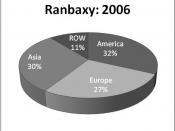The optimal marketing of pharmaceutical products on a global basis is becoming increasingly important to drug companies financially and more challenging to them strategically. This paper will examine, from the perspective of a global pharmaceutical marketing researcher, the 'best practices' for developing a promotional approach that will be coherent across all countries and audiences, while also having maximum impact at the local level.
Historically, approaches to global optimisation have fallen at the two ends of a centralisation/decentralisation spectrum. Those pharmaceutical companies taking a centralised approach would typically develop a 'Branding' in the USA, where 60-70 per cent of most pharmaceutical markets are found and then simply translate the promotional materials into other languages for launch in other countries.
At the decentralised end of the spectrum, pharmaceutical companies allowed each of their 'in-country' operating units to develop virtually the entire promotional platform for the product, without any coordination with their sister companies in other countries.
Having pursued both of these extremes, pharmaceutical companies have come to recognise that a totally centralised approach is inadequate to deal with the significant regulatory, reimbursement and cultural differences that are to be found across countries, while the totally decentralised approach has been found to be inefficient and, in a world increasingly globalised via channels ranging from Key Opinion Leaders to the internet, unacceptably disorganised. A 'happy compromise' has thus been reached, wherein most pharmaceutical companies develop a promotional 'manual' for a product, which includes key promotional points to which local companies are expected to adhere, while allowing local companies freedom as to tactical implementation at the local level.
But how does one do this on a rigourous basis and in such a way as to ensure that both efficiency and flexibility are optimised? The answer, discovered in work with major global pharmaceutical companies, is...


